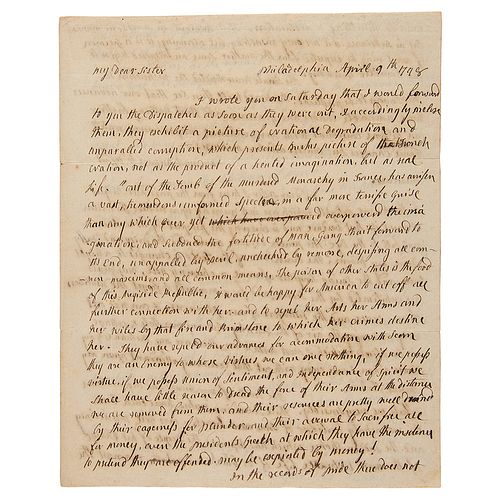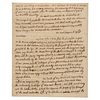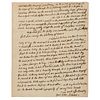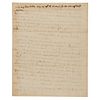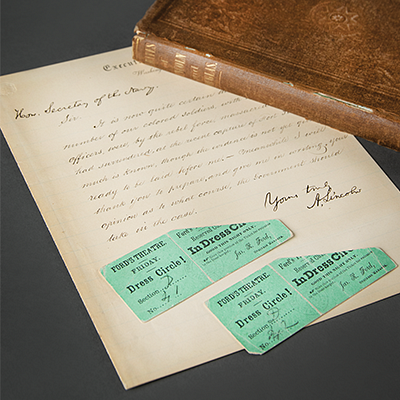Abigail Adams Autograph Letter Signed as First Lady on French Revolution: "National Degradation and unparalled corruption"
Two ways to bid:
- Leave a max absentee bid and the platform will bid on your behalf up to your maximum bid during the live auction.
- Bid live during the auction and your bids will be submitted real-time to the auctioneer.
Bid Increments
| Price | Bid Increment |
|---|---|
| $0 | $5 |
| $50 | $10 |
| $200 | $25 |
| $500 | $50 |
About Auction
Sep 23, 2023
RR Auction support@rrauction.com
- Lot Description
ALS as first lady, signed “I am most affectionately, your sister, Adams,” three pages on two adjoining sheets, 8 x 10, April 9, 1798. Handwritten letter from Philadelphia to her older sister, Mary Smith Cranch, quoting from Edmund Burke's 'Letters on a Regicide Peace' and commenting at length on America's relations with France amidst the French Revolution. She goes on to express delight in the spring season, mourn the deaths of friends and acquaintances, and offer other family news.
In full: "I wrote you on saturday that I would forward to you the Dispatches as soon as they were out. I accordingly inclose them. they exhibit a picture of National Degradation and unparalled corruption, which presents Burks picture of the French Nation, not as the product of a heated imagination, but as real Life. 'out of the Tomb of the Murdered Monarchy in France, has arrisen a vast, tremendous, unformed spectre, in a far more terrific Guise than any which ever yet overpowerd the imagination, and subdued the fortitude of Man, Going strait forward to its End, unappalled by Peril, unchecked by remorse, despising all common maxims, and all common means. The poison of other states is the food of this Regiside Republic.' it would be happy for America to cut off all further connection with her, and to repel her Arts her Arms and her wiles, by that fire and Brimstone to which her crimes destine her. They have repeld our advances for acommodation with scorn they are an Enemy to whose Virtues we can owe nothing. if we possess virtue, if we possess Union of sentiment, and Independance of spirit we Shall have little reason to dread the force of their Arms at the distance we are removed from them, and their resources are pretty well drained by their eagerness for Plunder, and their avowal to sacrifice all for money. even the Presidents speech at which they have the insolence to pretend they are offended, may be expiated by money!
In the records of Pride there does not exist so insulting a declaration. It is insolent in words, in manner but in substance, it is not only insulting but alarming. it is a specimen of what may be expected from the Masters. Some are disposed to give to our Humbled Country.
The senate have directed the instruction to our Envoys to be publishd. the World will then see that our advances were honorable candid and generous, and that nothing further can be done consistant with our National Independance, untill France changes her Rulers and her measures—
We must prepare to defend ourselves.
My dear sister I turn from the painfull subject to the Rural delights which are just opening upon us here. the willow assumes its lost verdure and is cheering the prospect by its coulour so gratefull to the Eye. the peach blosom opens and the daisy and daffy adorn my Room. the brown hue of the Feild is changed to a bright Green, and the spring songsters assume a cheering note. my spirits are exhilirated by the Scene, and for a moment I forget the disturbers of our Peace, and the destroyers of our pleasures. I can ride out daily and enjoy the air of the Country, but my own state & cottage are the objects which I most wish to see. there are my Relatives & my Friends whom I can enjoy with out that ceremony attendant upon my Present station.
The Death of my Friends and acquaintance affcets me very sensibly. three succeeding weeks have each been the melancholy harbinger of some new breach. mrs Gill mrs Quincy and the Sudden stroke which has deprived the people of his Charge of the most valuable Life of Dr Clark, is amongst the unsearchable Ways of Providence. in the midst of his days, in the vigor of his usefullness, he is suddenly calld to a higher & superiour station, as the reward 493 we rationally hope of having been a good and Faithfull servant in the vineyard of his master.
The loss is to the survivors. that indeed is great. at such a period as the present, when the Ministers of Religion are amongst the firmmest supporters of our Government, We may justly adopt the words of Scripture and say:
'Help Lord, for the Godly Man ceaseth, and the faithfull fail from among the Children of Men.'
I intended to have written to cousin Betsy to day, but must omit it untill the next Post. I inclose a Receit for a small Box sent to Boston to mr smiths care. it is for cousin Betsy. be so good as to send to him the Receit. I forgot to inclose it to him yesterday. I have subscribed or rather mr Brisler has for Porcupines paper which will be sent by the next Post as directed, three Papers a week. I hope to get a Letter from you to day. I had the baby with me on sunday it is very well. it had a hundred Pock & for three days & nights was very sick, but is happily through. it is a quiet Little Creature. nothing would give me greater pleasure than myself to present it to the Arms of mrs Black. I feel what a Gaurdian and Parent the little orphan will find, and hope they will both live to be mutual blessings to each other. with my kindest wishes for the Health happiness & Prosperity of all my Dear Friends." She adds a brief postscript on the reverse: "pray my dear sister dispose of the inclosed for the use of miss Paine." In fine condition.
Unlike her predecessor, Abigail Adams took an active role in politics during her husband's administration—leading some to refer to her as 'Mrs. President.' As John Adams's confidant, she was well informed on issues facing her husband's administration and of current events in general. Here, she communicates with her sister regarding the French Revolution, forwarding dispatches that "exhibit a picture of National Degradation and unparalled corruption." Evoking the words of influential political philosopher Edmund Burke, she recommends cutting all ties to France and alludes to the so-called XYZ Affair—a political and diplomatic episode involving a confrontation between the United States and Republican France that led to the Quasi-War.
Adams writes notes that the "senate have directed the instruction to our Envoys to be publishd." On April 9th, the Senate voted sixteen to ten to print the instructions to the American commissioners sent to France in 1797 to negotiate issues surrounding privateering and the illegal seizure of American vessels at sea. In the documents released by the Adams administration, the names of the French agents—who demanded large bribes before proceeding to formal negotiations—were substituted with the letters X, Y, and Z. Adams expresses confidence that the publication of the documents will offer proof that the United States was "honorable candid and generous" in their negotiating stance.
A fascinating autograph letter by First Lady Abigail Adams, demonstrating her sophisticated grasp of global politics and her insight into the affairs of the John Adams administration.
Provenance: The archive of a direct descendant of Abigail Adams's only sister, Mary Cranch. Never before offered. - Shipping Info
-
Bidder is liable for shipping and handling and providing accurate information as to shipping or delivery locations and arranging for such. RR Auction is unable to combine purchases from other auctions or affiliates into one package for shipping purposes. Lots won will be shipped in a commercially reasonable time after payment in good funds for the merchandise and the shipping fees are received or credit extended, except when third-party shipment occurs. Bidder agrees that service and handling charges related to shipping items which are not pre-paid may be charged to a credit card on file with RR Auction. Successful international Bidders shall provide written shipping instructions, including specified Customs declarations, to RR Auction for any lots to be delivered outside of the United States. NOTE: Declaration value shall be the item’(s) hammer price and RR Auction shall use the correct harmonized code for the lot. Domestic Bidders on lots designated for third-party shipment must designate the common carrier, accept risk of loss, and prepay shipping costs.
-
- Buyer's Premium



 EUR
EUR CAD
CAD AUD
AUD GBP
GBP MXN
MXN HKD
HKD CNY
CNY MYR
MYR SEK
SEK SGD
SGD CHF
CHF THB
THB